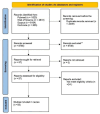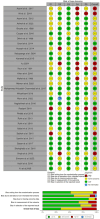Efficacy of vitamin D supplementation on the incidence of preeclampsia: a systematic review and meta-analysis
- PMID: 39716171
- PMCID: PMC11668112
- DOI: 10.1186/s12884-024-07081-y
Efficacy of vitamin D supplementation on the incidence of preeclampsia: a systematic review and meta-analysis
Abstract
Background: Preeclampsia is a severe pregnancy complication affecting 2-8% of pregnancies globally, contributing to substantial maternal and fetal morbidity and mortality. Vitamin D deficiency has been associated with an increased risk of preeclampsia, yet the efficacy of its supplementation during pregnancy in reducing preeclampsia incidence remains uncertain.
Objectives: This systematic review and meta-analysis aimed to evaluate the impact of vitamin D supplementation on the incidence of preeclampsia and related maternal and neonatal outcomes.
Method: We systematically searched PubMed, Scopus, Cochrane Library, and Web of Science until August 2024 for randomized controlled trials (RCTs) examining the effects of vitamin D supplementation on preeclampsia. Eligible studies included pregnant women with varying doses of vitamin D supplementation compared to placebo or standard care. Primary outcomes were the incidence of pre-eclampsia and preterm labor; secondary outcomes included serum 25-hydroxyvitamin D levels, low birth weight, and APGAR scores. Data were synthesized using R statistical software, with effect measures reported as relative risk (RR) and mean difference (MD) with a 95% confidence interval (CI).
Results: A total of 33 RCTs involving 10,613 participants were included. Vitamin D supplementation significantly reduced the risk of preeclampsia by 44.8% (RR = 0.55, 95% CI [0.43, 0.71], P < 0.0001) and preterm labor by 30% (RR = 0.70, 95% CI [0.51, 0.96], P = 0.0286). Subgroup analyses indicated that the benefits were more pronounced when the control group received a placebo rather than low-dose vitamin D. Serum 25-hydroxyvitamin D levels significantly increased in the supplementation group (MD = 32.42 nmol/L, 95% CI [20.33, 44.50], P < 0.0001). However, no significant differences were observed in the incidence of low birth weight (RR = 0.65, 95% CI [0.42, 1.02], P = 0.057) or Apgar scores at 5 min (MD = 0.20, 95% CI [-0.01, 0.40], P = 0.057).
Conclusion: Vitamin D supplementation during pregnancy significantly reduces the risk of preeclampsia and preterm labor, though its impact on neonatal outcomes remains unclear. These findings underscore the potential value of vitamin D supplementation in prenatal care for improving maternal outcomes. Further research is needed to clarify its effects on neonatal health.
Keywords: Meta-analysis; Preeclampsia; Pregnancy; Preterm labor; Systematic review; Vitamin D.
© 2024. The Author(s).
Conflict of interest statement
Declarations. Ethical approval: Not applicable. Consent to Publish: Not applicable. Competing interests: The authors declare no competing interests.
Figures








References
Publication types
MeSH terms
Substances
LinkOut - more resources
Full Text Sources
Medical

